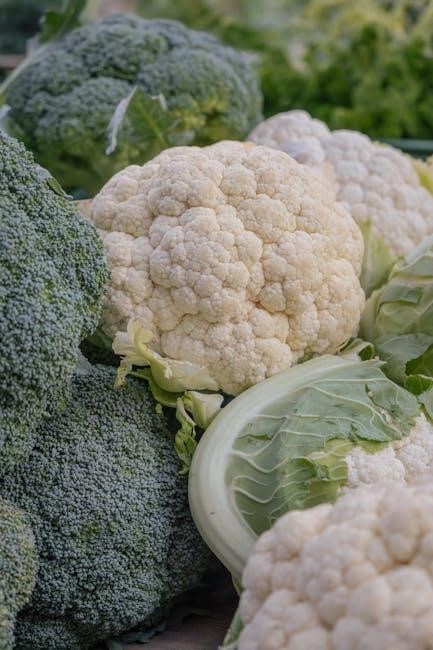Proper feeding is crucial for German Shepherds to maintain their energy, health, and physical condition. A balanced diet tailored to their age, size, and activity level ensures optimal wellness and prevents health issues.
1.1 Importance of Proper Nutrition for German Shepherds
Proper nutrition is vital for German Shepherds due to their high energy levels and large size. A well-balanced diet supports muscle growth, joint health, and immune function. German Shepherds are prone to health issues like hip dysplasia and digestive problems, which can be managed through appropriate feeding. Ensuring they receive essential nutrients helps prevent these conditions and promotes overall well-being. Regular veterinary check-ups and tailored diets are crucial to maintain their health and longevity, making nutrition a cornerstone of responsible German Shepherd ownership.
1.2 Key Considerations for Feeding German Shepherds
Feeding German Shepherds requires careful consideration of their life stage, weight, and activity level. Puppies need more frequent, nutrient-rich meals to support growth, while adults require balanced nutrition to maintain muscle mass. Seniors may need fewer calories and more joint support. Avoiding overfeeding is crucial to prevent obesity, which can lead to health issues. High-quality ingredients and consistent feeding schedules are essential to ensure optimal digestion and energy levels, tailored to their specific needs at each life stage.
Nutritional Needs of German Shepherds
German Shepherds are high-energy dogs requiring a balanced diet rich in protein, fats, and carbohydrates to maintain muscle mass and energy levels, while avoiding obesity and ensuring proper hydration.
2.1 Protein Requirements
German Shepherds require high-quality protein to maintain their muscular build and energy levels. Their diet should include 22-25% protein from animal sources like chicken, beef, or fish. Protein is essential for muscle repair, growth, and overall health. Avoid fillers like corn, as they lack nutritional value. Adequate protein intake supports their active lifestyle and prevents muscle wasting. Always consult a veterinarian to ensure the protein content meets your German Shepherd’s specific needs, especially as they grow or face health challenges.
2.2 Fat and Carbohydrate Needs
German Shepherds require a balanced intake of fat and carbohydrates for energy and overall health. Fats, particularly from animal sources like chicken or fish, provide essential fatty acids for skin and coat health. Carbohydrates, such as whole grains or vegetables, offer sustained energy and fiber for digestion. Avoid low-quality fillers like corn, as they provide little nutritional value. The right balance of fats and carbs supports their active lifestyle and prevents energy crashes, ensuring your German Shepherd remains vigorous and healthy.
2.3 Essential Vitamins and Minerals
German Shepherds require essential vitamins and minerals to maintain overall health. Vitamin A supports vision and immune function, while Vitamin D aids bone health. Vitamin E protects against oxidative stress, and B vitamins promote energy metabolism. Minerals like calcium and phosphorus are crucial for strong bones and teeth. Zinc supports skin health, and omega fatty acids enhance coat condition. High-quality dog foods typically provide these nutrients, but consulting a veterinarian ensures your German Shepherd’s diet is well-balanced and free from deficiencies.
2.4 Hydration and Water Intake
Hydration is vital for German Shepherds, as water makes up 70% of their body weight. It aids digestion, regulates body temperature, and supports overall health. Ensure constant access to fresh, clean water, especially in hot or active conditions. Monitor water intake, as excessive thirst may indicate health issues. Factors like age, size, and activity level influence needs, but most dogs drink 1-2 ounces per pound daily. Always provide water after meals and exercise to prevent dehydration and maintain optimal bodily functions for your German Shepherd’s well-being.

Feeding Schedule for German Shepherds
A well-structured feeding schedule is essential for German Shepherds, ensuring proper digestion and energy levels. Puppies, adults, and seniors require tailored feeding frequencies to support their growth, maintenance, and health needs.
3;1 Feeding Puppies (0-12 Months)
German Shepherd puppies require a nutrient-rich diet to support rapid growth and development. Feed 3-4 smaller meals daily until 6 months, then gradually reduce to twice a day. High-quality puppy food with protein as the first ingredient is essential. Avoid fillers like corn, as they provide little nutritional value. Ensure access to fresh water at all times. Monitor weight and adjust portions to prevent overfeeding. Consult a veterinarian to tailor feeding plans to individual needs and prevent growth-related issues. Consistency and quality are key for healthy development.
3.2 Feeding Adult German Shepherds (1-7 Years)
Adult German Shepherds require a balanced diet to maintain their energy and health. Feed high-quality dog food with adequate protein, fat, and carbohydrates. Aim for 2 meals daily, adjusting portion sizes based on activity levels. Avoid overfeeding to prevent obesity, a common issue in adults. Ensure fresh water is always available. Monitor their condition and adjust feeding to maintain a healthy weight. Proper nutrition supports joint health, digestion, and overall vitality. Consistency in feeding schedules and food quality is essential for long-term well-being.
3.3 Feeding Senior German Shepherds (8+ Years)
Senior German Shepherds require a diet tailored to their aging needs. Focus on joint health with glucosamine and chondroitin, and opt for easier-to-digest food. Reduce protein and fat intake if mobility declines. Monitor weight to prevent obesity, which can worsen joint issues. Divide meals into smaller portions to aid digestion. Consult your vet for specific recommendations, as seniors may develop health conditions requiring dietary adjustments. Ensure fresh water is always accessible to support overall health and hydration.
Choosing the Right Dog Food
Selecting the right dog food involves considering your German Shepherd’s age, health, and activity level. Opt for high-quality ingredients, avoiding fillers and by-products, and consult your vet for tailored advice to ensure optimal nutrition and prevent health issues.
4.1 High-Quality Dog Food Ingredients
High-quality dog food for German Shepherds should feature real meat as the first ingredient, such as chicken or lamb, ensuring ample protein for muscle growth. Whole grains like brown rice and oats provide sustained energy, while vegetables offer essential vitamins and minerals. Avoid fillers like corn and wheat, which can cause allergies. Look for added supplements like glucosamine for joint health and omega fatty acids for skin and coat health. Always choose food with AAFCO certification, ensuring it meets nutritional standards for your German Shepherd’s life stage.
4.2 Breed-Specific Diets for German Shepherds
Breed-specific diets for German Shepherds are formulated to meet their unique nutritional needs, focusing on joint health, digestion, and energy levels. These diets often include ingredients like glucosamine to support their large joints and omega fatty acids for skin and coat health. They may also address common allergies or sensitivities. Portion control and balanced nutrients ensure optimal weight management, preventing obesity while maintaining muscle mass. These diets are tailored to their high activity levels and genetic predispositions, making them a great choice for maintaining overall health and longevity.
4.3 Reading Dog Food Labels
Reading dog food labels is essential to ensure your German Shepherd receives a balanced diet. Look for the protein source, such as chicken or lamb, as the first ingredient. Check the fat and carbohydrate content, ensuring they meet your dog’s energy needs. Avoid fillers like corn and wheat, which provide little nutritional value. Verify the food is certified by organizations like AAFCO, ensuring it meets nutritional standards. Understand the nutritional adequacy statement to confirm it’s suitable for your dog’s life stage. Avoid artificial preservatives and opt for whole, named ingredients for optimal health.
Common Feeding Mistakes to Avoid
Inconsistent feeding schedules and overfeeding are common mistakes, leading to obesity. Avoid giving table scraps to prevent digestive issues and maintain a balanced diet. Monitor portion sizes closely to ensure your German Shepherd stays healthy and active;
5.1 Overfeeding and Obesity Risks
Overfeeding is a prevalent issue that can lead to obesity in German Shepherds, increasing the risk of health problems like hip dysplasia and diabetes. Monitoring food intake and avoiding excessive treats is essential. Obesity can also strain joints and reduce lifespan. Regularly measuring portions and maintaining a balanced diet helps prevent weight gain. Consulting a veterinarian for portion guidance ensures optimal health and prevents obesity-related complications in German Shepherds.
5.2 Feeding the Wrong Type of Food
Feeding German Shepherds the wrong type of food can lead to nutritional deficiencies and health issues. Avoid foods with excessive fillers like corn, as they provide little nutritional value and may cause allergies. High-quality protein sources should be the primary ingredient. Raw or undercooked foods can pose health risks, while overcooked foods lose essential nutrients. Ensuring the diet is balanced and appropriate for their life stage is crucial for maintaining their health and preventing digestive problems or allergies.
5.3 Inconsistent Feeding Schedules
Inconsistent feeding schedules can disrupt a German Shepherd’s digestion, leading to digestive upset, weight fluctuations, and behavioral issues. Establishing a regular feeding routine helps maintain their metabolic balance and prevents overeating or undereating. Irregular feeding can also cause anxiety in dogs, as they rely on predictable meal times. Consistency ensures optimal nutrient absorption and supports overall health. German Shepherds thrive on structure, making a reliable feeding schedule essential for their well-being and long-term health.

Homemade Diet for German Shepherds
A homemade diet allows customization to meet a German Shepherd’s specific needs, but it requires careful planning to ensure nutritional balance and avoid deficiencies. Veterinary guidance is essential.
6.1 Pros and Cons of Homemade Diets
A homemade diet for German Shepherds offers customization to meet individual needs, avoiding potential allergens and low-quality fillers. It allows owners to use fresh, wholesome ingredients, which can improve digestion and overall health. However, homemade diets require meticulous planning to ensure nutritional balance, as deficiencies in essential vitamins or minerals can occur. Additionally, preparing homemade meals can be time-consuming and costly; Without proper guidance, owners may inadvertently create an unbalanced diet, risking long-term health issues. Veterinary consultation is crucial to avoid these pitfalls and ensure a well-rounded diet.
6.2 Balancing Nutrients in Homemade Meals
Balancing nutrients in homemade meals for German Shepherds is essential for their health; A typical diet should include 50% protein (meat, fish, or eggs), 30% vegetables (sweet potatoes, carrots), and 20% whole grains or legumes. Essential vitamins like A, D, and E, along with minerals such as calcium and phosphorus, must be included. Omega-3 fatty acids from sources like fish oil support skin and joint health. It’s important to avoid over-supplementation, as this can lead to health complications. Regular veterinary check-ups ensure the diet remains balanced and meets the dog’s evolving needs.
6.3 Veterinary Recommendations for Homemade Diets
Veterinarians recommend consulting with a canine nutritionist to ensure homemade diets for German Shepherds are nutritionally complete. They advise regular blood tests to monitor health and adjust recipes as needed. Homemade meals should avoid fillers and focus on whole, easily digestible ingredients. Vets also suggest rotating protein sources to prevent allergies and ensuring meals are free from harmful substances like onions or chocolate. Proper portion control and a gradual transition to homemade food are crucial to prevent digestive issues.

Food Allergies and Sensitivities in German Shepherds
German Shepherds often develop allergies to common ingredients like beef, dairy, or soy. Symptoms include itching, skin issues, and digestive problems, requiring dietary adjustments to alleviate discomfort.
7.1 Common Food Allergens for German Shepherds
Common allergens for German Shepherds include beef, chicken, lamb, dairy, eggs, soy, and wheat. These ingredients can trigger immune responses, leading to skin issues and digestive problems. Identifying and eliminating these allergens through an elimination diet or switching to novel protein sources like venison or fish can help alleviate symptoms. High-quality, hypoallergenic diets are often recommended to ensure the dog’s nutritional needs are met without triggering adverse reactions.
7.2 Signs of Food Allergies or Sensitivities
German Shepherds with food allergies or sensitivities often exhibit skin issues, such as itching, redness, or infections. Gastrointestinal symptoms like diarrhea, vomiting, or gas may also occur. Some dogs develop ear infections or excessive shedding. These reactions can appear suddenly or gradually over time. If you notice persistent or severe symptoms, consult a veterinarian to identify the allergen and adjust their diet accordingly. Early intervention is key to preventing long-term health complications and improving your dog’s quality of life.
7.3 Diagnostic Steps for Food Allergies
Diagnosing food allergies in German Shepherds typically involves an elimination diet followed by a food trial. Vets recommend removing common allergens like beef, dairy, or soy for 8-12 weeks. Symptoms should improve if an allergy exists. Afterward, reintroduce ingredients one at a time to pinpoint the culprit. Blood tests are less reliable, so dietary changes are the primary diagnostic tool. Consistency and patience are key to identifying and managing food sensitivities effectively.
Feeding German Shepherds with Specific Health Conditions
Diet plays a crucial role in managing health conditions like hip dysplasia, digestive issues, and skin allergies. Tailored nutrition supports recovery and maintains overall well-being.
8.1 Feeding German Shepherds with Hip Dysplasia
German Shepherds with hip dysplasia benefit from a diet rich in joint-supporting nutrients like glucosamine and chondroitin. Avoid foods with excessive fillers, as they can lead to weight gain, worsening joint strain. Opt for high-quality, balanced diets with lean proteins and omega-3 fatty acids to reduce inflammation. Raw or vet-formulated diets are often recommended to manage the condition effectively. Additionally, consult your veterinarian to tailor meals according to your dog’s specific needs and ensure proper weight management to alleviate hip stress.
8.2 Feeding German Shepherds with Digestive Issues
German Shepherds with digestive issues benefit from a gentle, easily digestible diet. Opt for limited-ingredient foods or novel protein sources like venison or duck to reduce sensitivities. Incorporate fiber-rich ingredients such as sweet potatoes or pumpkin to support gut health. Avoid fillers and artificial additives that can irritate their digestive system. Small, frequent meals can help ease digestion. Consult your veterinarian to tailor a diet that addresses specific conditions like inflammatory bowel disease or food allergies, ensuring your dog’s digestive health improves over time.
8.3 Feeding German Shepherds with Skin Conditions
German Shepherds with skin conditions often benefit from hypoallergenic diets to reduce inflammation and irritation. Limited-ingredient foods with novel protein sources like salmon or venison can help identify and eliminate allergens. Omega-3 fatty acids from fish oil or flaxseed support skin health and reduce itching. Avoid foods with common allergens such as beef, dairy, or soy. Grain-free options may also be beneficial for some dogs. Consistency and gradual dietary changes are key to managing skin issues effectively. Always consult a veterinarian to tailor the diet to your dog’s specific needs.

Monitoring and Adjusting Your German Shepherd’s Diet
Regularly monitor your German Shepherd’s weight, energy levels, and overall health to ensure their diet meets their needs. Adjust portion sizes or food types as necessary, and consult a veterinarian for personalized advice to maintain optimal health.
9.1 Signs of a Well-Fed German Shepherd
A well-fed German Shepherd displays a shiny, thick coat, healthy skin, and good muscle tone. They maintain an ideal weight, with visible ribs but not overly prominent. Energy levels are consistent, and digestion is regular. A well-nourished GSD shows no signs of obesity or malnutrition, with a robust immune system and vibrant overall health. Their double coat should be full and glossy, reflecting proper nutrient absorption. A happy, active demeanor further indicates they are receiving a balanced and adequate diet tailored to their needs.
9.2 Adjusting Portion Sizes and Food Types
Adjusting portion sizes and food types ensures your German Shepherd’s dietary needs are met throughout their life. Monitor their weight, activity level, and overall health to determine if changes are necessary. Puppies, adults, and seniors require different calorie intakes and nutrient balances. If your GSD gains or loses weight, tweak portion sizes gradually. For health conditions, switch to specialized diets, such as grain-free or low-fat options. Always consult a veterinarian before making significant changes to ensure the adjustments align with your dog’s specific needs and promote long-term well-being.
9.3 Regular Veterinary Check-Ups for Dietary Health
Regular veterinary check-ups are essential to ensure your German Shepherd’s diet supports their overall health. Vets monitor weight, body condition, and health markers to assess whether adjustments are needed. They can identify issues like obesity or nutrient deficiencies early, preventing long-term problems. For dogs with specific conditions, vets provide tailored dietary recommendations. Annual or bi-annual visits help maintain a balanced diet and address any emerging health concerns, ensuring your GSD thrives at every life stage with a well-adjusted and nutritious meal plan.